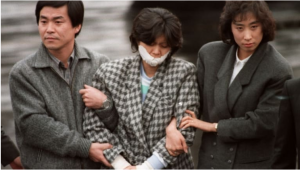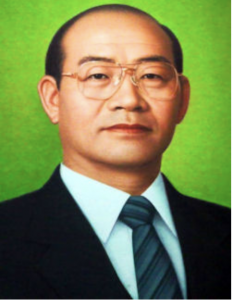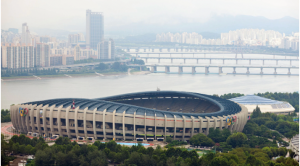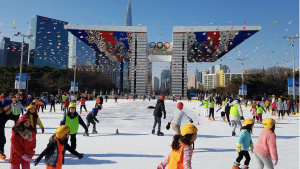Abanaub Marzouk
Bombing a South Korean Civilian Airliner
It started like a normal day for passengers boarding flight KAL 858 from Baghdad, Iraq, to Seoul, South Korea. But North Korea had different plans: Kim Hyon-hui, a North Korean agent, left a bomb in an overhead bin, which ended up detonating above the Andaman Sea. The bomb killed all 115 passengers and crew members on board, resulting in the plane never making it to its next stop, Bangkok, Thailand[1]. People were left hazed wondering: why? What was the reason for this terrorist attack? Knowing that hosting the prestigious Olympic games would immediately result in a powerful South Korea, North Korea wanted to obstruct such a possibility in any way possible. South Korea becoming more powerful meant that all the North’s hope of one day taking the South under their communist way was out the window. In other terms, if South Korea hosted the games, then North Korea would say farewell to their dreams. As you can tell, North Korea could not live with that.

This led to Kim Il-sung and his son Kim Jong-il brainwashing the North Korean spy Kim Hyon-hui. Hyon-hui was given an assignment along with an accomplice to plant bombs on a South Korean aircraft. Hyon-hui mentioned that Kim Il-sung was glorified and anything ordered by him would be easily justified, even killing 115 people.[2] Hyon-hui was told that if she were successful, she would be able to return to her family and never have to work as an agent again. That was a lie. (The video below demonstrates what Hyon-hui went through and how much she was brainwashed. Hyon-hui speaks out regretting what she did that horrible day and stands against the North Korean Regime.)
Prior to North Korea planning such a malicious attack, the North proposed in 1985 that North and South could jointly host the games. But of course, North Korea had their demands. North Korea wanted three things: games must be organized jointly, events must be equally shared between both parties, and they also wanted the official title to be changed to “Korea Pyongyang Seoul Olympic Games” (Pyongyang is the capital of North Korea). North Korea has always had a violent tendency and mentioned that if these requirements were not met, then an “accident error” would have disastrous effects on the Olympic Games. Despite the terrorist attack on the civilian aircraft and the fears surrounding the Olympics, it did not stop South Korea from hosting the 1988 Seoul Olympics, which consequently helped Korea become the nation it is today.
Why Host the Olympics?
While there were pros and cons to hosting a world-wide, multi-million dollar event, the pros outweighed the cons for South Korea in 1988. These pros included exposing South Korea to the rest of the world and making monetary gains for the nation through tourism. The biggest reason for South Korea’s desire to host the Olympics included proving itself to other nations for legitimacy with foreign affairs in the international community; inviting every single country that partakes in the Olympics to South Korea would surely do that. In a way, South Korea would be able to show its true colors and how different it was from North Korea. Additionally, one of the biggest motivations for hosting the games was President Chun Doo-Hwan’s hope of finally legitimizing his authoritarian way of leading against the growing need for a democratic government.[3] President Chun Doo-Hwan was a South Korean soldier who rose to be a politician, which led to his presidency from 1980-1988.[4] As soon as President Chun Doo-Hwan took over, he continued President Park Chung-Hee’s work of legitimizing their style of leadership [xxlink to Park dictator chapter] to the rest of the world. The only problem facing Chun was the fact that he gained power through a coup: an illegal seizure of power in the eyes of many countries, especially in the eyes of the United States.[5] However, the United States supported President Chun Doo-Hwan with his bid to host the games and even more after the terrorist attack with their support of amping up security for the games. It’s important to mention that the South Korean government and National Assembly heavily opposed and discouraged President Chun Doo-Hwan

The Economic Impact of the Olympics on South Korea
Prior to the Olympics, the economy of South Korea was on the rise with President Park’s reforms to legitimize South Korea to the rest of the world.[6] However, it just needed President Chun Doo-Hwan’s last push. It all began with South Korea suffering heavily from the impacts of a multitude of wars, such as the Korean War, the Vietnam War, etc. The Korean War (1950-53) was a conflict between South Korea and North Korea that was never resolved.[7] North Korea wanted to unify the South and North into one big communist society. The war ended up with countries intervening and taking sides between communism and capitalism. For example, North Korea was supported by China and the Soviet Union while South Korea was supported by the United Nations, but mainly the United States. The Vietnam War caused a catastrophic effect because South Korean troops were the first to enter South Vietnam in 1964 and the last to depart 10 years later. One can see how this impacted the economy because there were nearly 16,000 casualties and at the same time South Korea had to maintain 50,000 troops.[8] The point is that one can see how South Korea took a hit to their economy because of the wars that happened, not to mention the earlier colonial occupation by Japan. The Olympics is what changed that around for South Korea.
And so the 1988 Seoul Olympics took place, proving to be one of the greatest events to happen in South Korea history. At the time, it was the biggest Olympic event ever to be hosted. With over 160 nations and over 10,000 athletes visiting South Korea it was inevitable that the economy would improve in many ways.[9] Hosting the games led to the improvement of social infrastructure, which meant that South Korea became much more appealing for an foreign individual to want to live or visit there.[10] For example, a grand stadium was built for the Olympics with many health-care and training facilities. Another aspect that improved the economy that came with hosting the games was the allocation of many needed jobs.

These jobs came with the stadium and facilities that were built in order to host and train olympians. These jobs did not go anywhere after the games, because people were still needed to run the stadium and facilities. As a matter of fact, the stadium became home to the Korean national football team. Additionally, tourism was boosted in South Korea because the international Olympic coverage exposed its cultural and nature attractions to many people around the world. The South Korean government did its best to spread the word to the world by sending tourist attraction teams to different parts of the world. For example, some teams were sent to parts of Europe to advertise the 1988 Seoul Olympics. It is obvious that South Korea wanted to take advantage of this opportunity to further advance the country.[11]
Conclusion
It all started when South Korea placed their bid to host the games, which left North Korea pressed. North Korea wanted to stop the games from happening in South Korea at all cost. This lead to the planning of the bombing of flight KAL 858 in 1987. This tragic attack killed all 115 crew members and passengers. Despite the North Korea terrorist attack, South Korea continued to host the Olympic games.

This came with many risks, such as another terrorist attack that could disrupt the 1988 Seoul Olympics or the possibility of it failing the already deprived economy. I feel that South Korea’s ability to host the Olympics after such a disastrous attack not only proved to North Korea that South Korea can not be messed with, but also proved to all the foreign and neighboring countries their legitimacy. In the end, South Korea took a chance and proved to be successful with furthering their legitimacy to foreign countries and boosting the state of the economy. The 1988 Seoul Olympics has proved to leave a significant impact on South Korea for the better.
Bibliography
Bridges, Brian. “The Seoul Olympics: Economic Miracle Meets the World.” International Journal of the History of Sport 25, no. 14 (December 2008): 1939–52. https://doi.org/10.1080/09523360802438983.
Duckworth, Austin. “‘Decisive Political Means’: International Security Cooperation and the 1988 Seoul Olympic Games.” Journal of Sport History 48, no. 1 (2021): 17–32. muse.jhu.edu/article/800170.
Kim, Byung-Kook, Byung-joon Jun, Ezra F. Vogel, Ezra F. Vogel, Chang Jae Baik, Jorge I. DomÃnguez, Yong-Sup Han, Sung Gul Hong, Paul D. Hutchcroft, and Hyug Baeg Im. The Park Chung Hee Era: The Transformation of South Korea. Cambridge: Harvard University Press, 2011. http://ebookcentral.proquest.com/lib/muhlenberg/detail.action?docID=3301228.
“Korea – Chun Doo Hwan,” globalsecurity.org, https://www.globalsecurity.org/military/world/rok/president-chun-doo-hwan.htm.
Leff, Gary. “Korean Air 858: Why The Confessed Terrorist Went Free.” View from the Wing, January 26, 2020, https://viewfromthewing.com/korean-air-858-terrorist-went-free/.
Meyers, Morley. “Seoul Surprises Nagoya for Olympic Bid.” UPI Archives, Sept. 30, 1981, https://www.upi.com/Archives/1981/09/30/Seoul-surprises-Nagoya-for-Olympic-bid/5566370670400/.
Wingfield-Hayes, Rupert.“The North Korean Spy Who Blew up a Plane.” BBC News, April 22, 2013, https://www.bbc.com/news/world-asia-22244337.
- Gary Leff, “Korean Air 858: Why The Confessed Terrorist Went Free,” View from the Wing, January 26, 2020. https://viewfromthewing.com/korean-air-858-terrorist-went-free/. ↵
- Rupert Wingfield-Hayes,“The North Korean Spy Who Blew up a Plane,” BBC News, April 22, 2013, https://www.bbc.com/news/world-asia-22244337. ↵
- Austin Duckworth, “‘Decisive Political Means’: International Security Cooperation and the 1988 Seoul Olympic Games,” Journal of Sport History 48, no. 1 (2021), 18. ↵
- “Korea - Chun Doo Hwan,” globalsecurity.org, https://www.globalsecurity.org/military/world/rok/president-chun-doo-hwan.htm. ↵
- Duckworth, “‘Decisive Political Means’,"20. ↵
- See the earlier chapter in this volume "South Korea's Development under Park Chung-Hee" ↵
- See also the following chapters: "Pre- and post-war Korea" and "The Civilian Perspective of the Korean War." ↵
- Byung-Kook Kim et al., The Park Chung Hee Era: The Transformation of South Korea (Cambridge: Harvard University Press, 2011), 426. ↵
- Brian Bridges, “The Seoul Olympics: Economic Miracle Meets the World,” International Journal of the History of Sport 25, no. 14 (December 2008): 1941-43. ↵
- Council on Foreign Relations.“The Economics of Hosting the Olympic Games,” https://www.cfr.org/backgrounder/economics-hosting-olympic-games. ↵
- Brian Bridges, “The Seoul Olympics: Economic Miracle Meets the World,” International Journal of the History of Sport 25, no. 14 (December 2008): 1948-49. ↵
